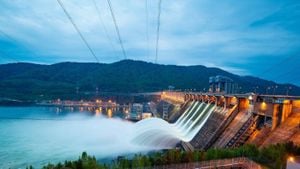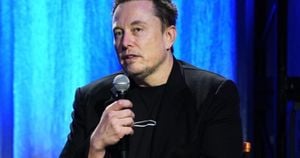The political arena is buzzing with excitement over Senator Marco Rubio's nomination by President-elect Donald Trump as the next U.S. Secretary of State. This marks him as the first Latino to hold this pivotal diplomatic role, creating ripples of anticipation about how Rubio's background and beliefs might impact U.S. foreign policy, particularly toward Latin America and China.
Rubio, born to Cuban immigrants and raised in Miami, has expressed his strong views shaped by his family's emigration from Havana before Fidel Castro's regime took hold. His upbringing instilled a fierce anti-communist sentiment, which forms the backbone of his political ideology. This perspective will likely guide his strategies with nations such as Venezuela and Cuba, where he is expected to adopt tougher diplomatic measures than his predecessors.
Three major focuses are anticipated under Rubio’s tenure: enhancing U.S.-Mexico relations, combating drug trafficking and migration issues, and addressing the influence of China across the Latin American region. With his Cuban heritage and experiences within the Latino community, Rubio aims to strengthen connections with homelands of many immigrants, signaling to them they have representation at America’s highest levels of diplomacy.
South American leaders’ responses to Rubio’s appointment reveal contrasting views. Some, like Argentinian President Javier Milei and El Salvador’s Nayib Bukele, are optimistic, envisioning favorable relations. Others, especially those on the political left, are cautious, worrying about potential shifts toward more aggressive stances reminiscent of Trump’s earlier administration.
Rubio’s appointment also marks what some analysts believe is a decisive shift from the Biden administration's dialogue-favoring approach. The former administration's diplomatic dealings leaned toward multilateralism and open dialogue, contrasting with the more confrontational style Rubio is expected to champion. His history of attacking leftist regimes and reframing U.S. involvement suggests changes might be on the horizon for regional dynamics.
Christopher Sabatini, a senior fellow at Chatham House, underlines this likelihood, noting how Rubio's focus may bring renewed attention to Latin America, often overshadowed by crises elsewhere. Yet, he cautions, this could also create friction, as aggressive tactics may alienate allies whom the U.S. seeks to support structurally.
On the international stage, Rubio's views on the Ukraine crisis are notable. He has been vocal about the necessity for Ukraine to pursue negotiations rather than simply reclaim all lost territories. This pragmatism, coupled with his voting history—such as his opposition to military aid packages for Ukraine—suggests he may steer foreign policy toward caution rather than interventionism when it involves extensive military involvement.
His past political stance exemplifies this restraint. Once seen as more hawkish, he has tempered his approach to align with Trump’s emphasis on reduced U.S. military engagement overseas. This evolution reflects the changing sentiments within the Republican Party, moving from overt support for international military operations to greater calls for measured involvement.
Adding to the complexity of his upcoming role, Rubio's prominence as chair of the Senate Intelligence Committee positions him as a key player against Chinese influence—noting his prior sanctions against Chinese officials—suggesting his diplomatic strategies may involve countering Beijing as well. His fierce critique of Chinese policies will likely echo throughout his tenure, influencing U.S. responses to regional adversaries more decisively.
By targeting human rights inconsistencies and authoritarian regimes, some see this nomination as a golden opportunity for those engaged in democracy movements across regions like Southeast Asia. Rubio has been active on several fronts, introducing key legislative acts aimed at addressing democracy and human rights abuses, particularly in countries like Cambodia and Vietnam.
His history showcases thorough engagement with human rights issues, illustrating how he could prioritize U.S. values alongside countering authoritarianism globally. His potential involvement could mark a transition back to recognizing the importance of human rights as part of American foreign policy agendas—an area often neglected by his predecessors.
Nevertheless, this shift raises questions on balancing tough postures against adversarial regimes and maintaining diplomatic ties. Can Rubio uphold Trump’s “America First” principles, all whilst addressing complex interrelationships with nations like Mexico and continuing to respond effectively to the growing influence of China?
Reflecting on his political history raises doubts as well. Rubio's previous criticism of both military and economic relationships without accountability may clash against the transactional nature of the Trump administration, which might challenge him to reconfigure these relationships strategically. His supporters argue he could mediate these conflicting aspects, bringing strategic foresight and ethical objectives back to the forefront.
Throughout his political career, Rubio has often positioned himself as not only concerned with foreign policy and military strategy but also acutely aware of human rights violations around the globe. If his nomination is followed through, this could very well reshape the fabric of U.S. diplomacy, introducing elements not just of economic and military prudence but also moral clarity.
The opportunity to treat Latin America as significant will bear considerable weight under Rubio's leadership. His societal roots, political experience, and ideological goals may truly culminate to reframe U.S. foreign policy, potentially revitalizing relations with countries long ignored by previous administrations.
Yet with embrace often also emerges skepticism. Pundits and global analysts will be watching closely, gauging how he navigates the fine line between stern diplomacy and the soft power the U.S. long engaged with, assessing how his stances will evolve on the global stage, particularly as new challenges unspool.
The coming months post-confirmation will reveal just how Rubio balances all these factors, crafting the identity of the nation’s stance abroad. His commencement marks not just personal triumph as the first Latino appointment but also holds potential to redefine America’s standing, both near and far—if he can match rhetoric with action.



